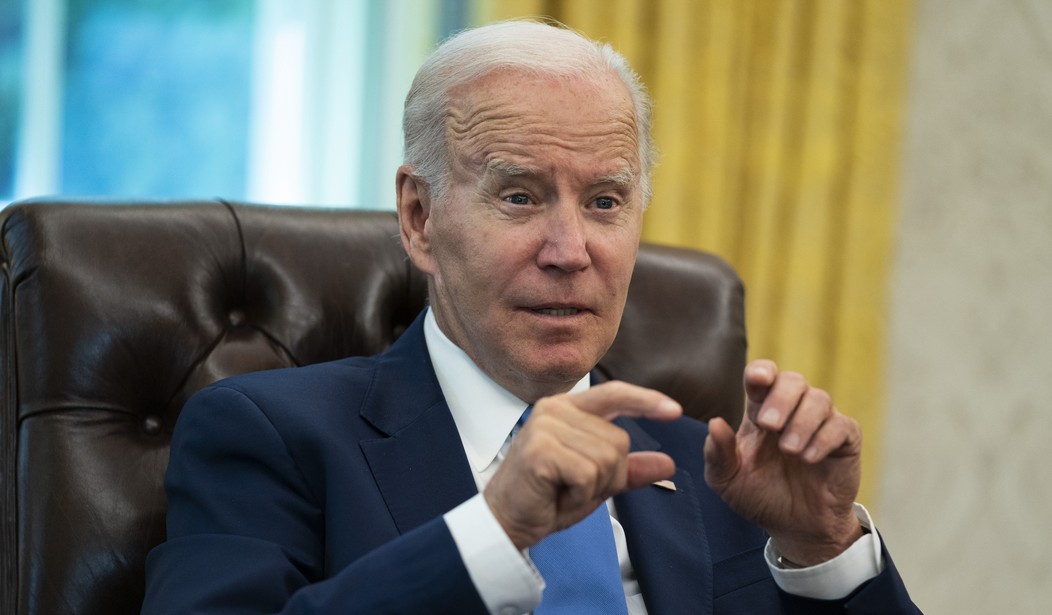When do you know you’re about to hear some bad economic data? When the White House starts attempting to define what’s bad so as to exclude practically any potential outcome in the report, grab your shorts.
Give the White House some credit for being unusually proactive in this case, though. It took them several months to get around to admitting inflation existed, and then spent several months trying to concoct a good cover story to shift the blame away from Joe Biden and his utter incompetence on energy and supply-chain policies. This time they’re getting their denial strategies in place up front, although this time it does have some truth to it:
The White House Council of Economic Advisers said on July 21 that even if Friday’s advance estimate of the country’s GDP is negative, it’s still “unlikely” to be indicative that the country is in a recession. …
“What is a recession? While some maintain that two consecutive quarters of falling real GDP constitute a recession, that is neither the official definition nor the way economists evaluate the state of the business cycle,” the blog post states.
Citing figures from the National Bureau of Economic Research, the post states that their “recession indicator variables” have “exhibited strong growth in the U.S. economy since the start of the pandemic, and have continued to expand through the first half of this year.”
Even if the Bureau of Economic Analysis’ advance estimate of the second quarter GDP shows a negative number, the blog post says the country is likely not in a recession.
“Based on these data, it is unlikely that the decline in GDP in the first quarter of this year — even if followed by another GDP decline in the second quarter — indicates a recession,” the post states.
Technically, they have a point. Recessions get officially identified by the NBER, which does look at a range of technical data to determine whether a recession has begun. Some of the more important data comes from consumer spending and employment, both of which were relatively strong in Q1 despite the negative GDP result. That contraction came from a massive trade imbalance, but the other fundamentals in Q1 looked relatively good. It doesn’t necessarily follow that a negative Q2 reading on GDP in Wednesday’s report will automatically indicate a recession.
But what does all of this rush to emphasize the process of recession identification tells us about Wednesday’s report? It must look pretty bad, or at least the White House must think it will look bad when it hits. If they thought that the report would fall into positive territory, there wouldn’t be any need for Biden staffers to write blog posts about the NBER and the technical definitions of recession. It’s pretty clear that Biden’s economic team think we’re heading into grab-your-shorts territory, and they’re shaping the PR battlefield to offer their Chip Diller “all is well” messaging.
That raises a couple of problems for Biden and his team, however. They ran the Chip Diller playbook on inflation all last summer and fall, first denying that inflation existed at all and that it just represented economic growth, then hid behind the word “transitory” for a few months before going into blameshifting mode. At this point, Biden’s credibility is shot, especially on economic matters. Attempts to dispute a recession may end up doing more political harm than good, although they don’t have much choice but to fend off recession talk until after the midterms.
And of course, they can’t do that either, as the Q3 numbers will come out in the last week of October, about two weeks ahead of the November 8 Election Day. If we really are in a recession, it will be blindingly obvious by that point, and even the NBER won’t be able to deny it with three negative quarters in a row.
The White House has a bigger problem than just definitions, too. The NBER may not get around to declaring a recession at this precise moment, but consumers are beginning to feel as though the recession has already arrived. They are spending less as a result, and in an economy that is 70% consumer spending, that will trigger a recession on its own. Runaway inflation has eroded their buying power, which means the same paycheck buys less. Furthermore, the Federal Reserve is in the middle of a months-long strategy to get interest rates up to match core CPI inflation in order to dial down demand, which is also recessionary in almost every potential outcome at the moment.
Add that to the rumblings of trouble on the jobs-market front, and the risks of recession are escalating quickly. Consumer spending and employment activity are two of the big technical indicators used by the NBER to define a recession. Even if the NBER doesn’t declare a recession this week on the basis of an expected negative-GDP report, it’s inevitable at some point under the circumstances.
None of this will keep Biden and his team from their normal denial-blameshifting routine, of course. That will help them plumb the depths of the confidence-crisis cascade that Biden started with his denial and blameshifting for his disastrous withdrawal from Afghanistan and all of his denial and blameshifting on inflation, too. They’re just better prepared for it this time around.








